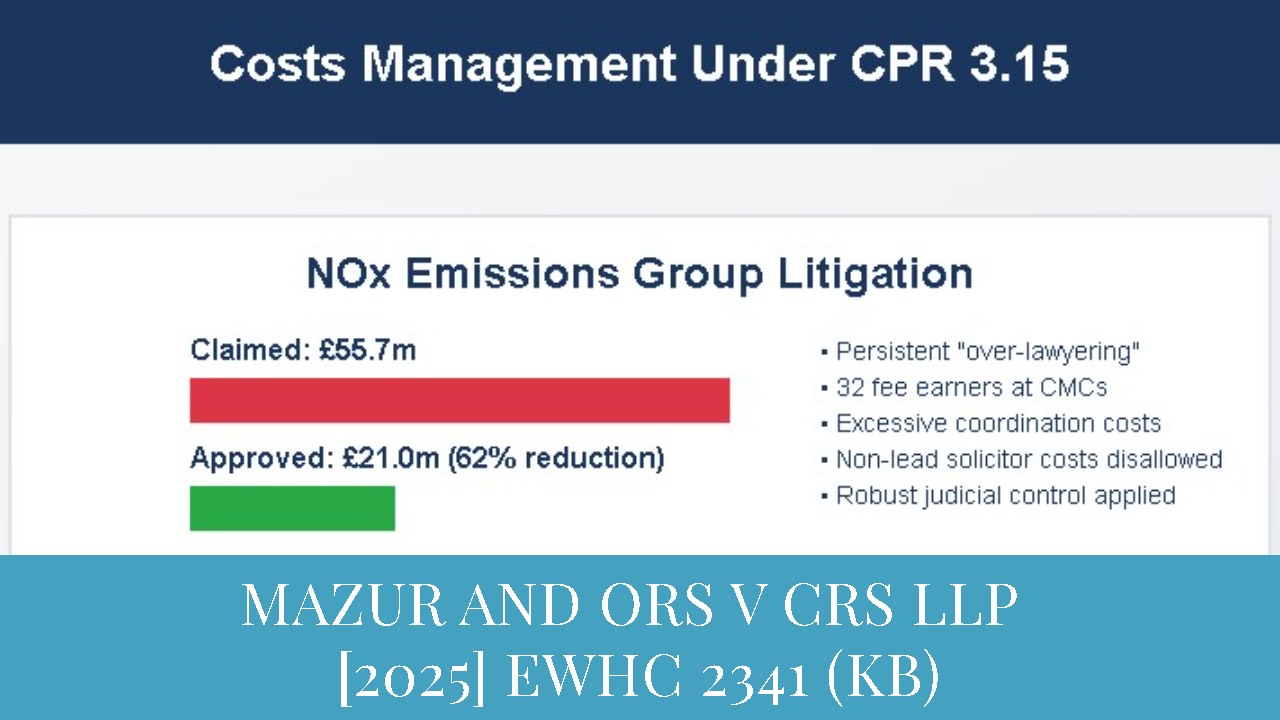Background
In CFB v AXA Insurance UK PLC the Claimant, CFB, a protected party represented by a litigation friend due to a severe brain injury sustained from a fall at a construction site on 12 March 2019, succeeded in obtaining a £1 million settlement from AXA Insurance under the Third Party (Rights against Insurers) Act 2010.
During the proceedings, complex issues arose, including the denial of employment by the employer and AXA’s attempt to avoid the insurance cover based on non-disclosure of the Claimant’s immigration status.
The settlement precipitated two claims for costs: one inter partes claim (the Claimant’s costs against the Defendant) and one solicitor-client claim for costs (Prince Evans Solicitors LLP’s costs against the Claimant). The hearing for the costs determination took place over multiple dates: 7 August 2024, 12 December 2024, and 24 January 2025.
The settlement of inter partes costs stood at £378,000 (inclusive of interest and assessment costs) against a claim of £439,167.62. The solicitor-client costs included additional liabilities such as a success fee of £31,413.80 and an ATE premium of £1,680, along with a shortfall in costs recovered from the Defendant and a separate sum for “pure” solicitor-client costs amounting to over £23,000.
Costs Issues Before the Court
The costs issues before the court involved two primary claims. The inter partes claim needed approval for the settlement reached, involving a recovery percentage of approximately 85%. The more contentious issue was the solicitor-client claim.
Prince Evans Solicitors LLP (PE) sought recovery for additional liabilities, a shortfall in costs not recovered from AXA, and separate “pure” solicitor-client costs. These claims encompassed work related to the solicitor-client relationship beyond the settlement proceedings, specifically covering issues such as immigration advice and costs related to the Claimant’s appointment of a deputy under the Court of Protection.
The Parties’ Positions
Regarding the inter partes costs, the parties agreed on a settlement of £378,000 against a claim of £439,167.62. The negotiations for settlement appeared to have considered various vulnerabilities and potential deductions on assessment.
In addressing the solicitor-client costs, Prince Evans Solicitors LLP, through Mr. Roy KC, advocated for the court to take a “light touch” approach to approval, heavily relying on counsel’s advice. The solicitors argued that the current procedure for determining these claims was flawed, suggesting that a more lenient process aligned with the treatment of damages claims be adopted. They highlighted potential conflicts of interest given the litigation friend’s dual role as the solicitor’s spouse and the solicitor’s preference for a senior fee earner allaying concerns on the firm’s behalf.
The Court’s Decision
Costs Judge Brown scrutinised both the procedural aspects and the substantive costs claims put forward by Prince Evans Solicitors LLP.
In his decision, Costs Judge Brown addressed several criticisms raised by Mr Roy KC and Mr Smith, particularly regarding the scrutiny of solicitor-client cost claims. The Judge rejected the notion of a heavy presumption against approving settlements and underscored the necessity of detailed scrutiny in such cost matters given the potential conflicts of interest and the need to protect the interests of the protected party.
The court dismissed the suggested “light touch” approach, explaining that the existing rules mandated a meticulous examination of the costs claimed to ensure they were reasonable and in the interest of the protected party. Key to the judgment was the necessity to consider the merits of the costs claimed, not merely rely on the advice of learned counsel without further interrogation.
Concerns were raised over the high hourly rates charged, the substantial reliance on counsel, and the lack of delegation, which all contributed to an inflated costs claim. Furthermore, the claims for “pure” solicitor-client costs, including immigration advice and the appointment of a deputy, were considered highly unusual and possibly outside the scope of what could reasonably be charged under the CFA.
Ultimately, while the court approved the inter partes costs settlement, it refused to approve the solicitor-client cost deductions without a detailed assessment. The judgment emphasised that proper scrutiny and assessment were indispensable to safeguarding the interests of vulnerable parties and ensuring fair and reasonable solicitor remuneration.`

![CFB v AXA Insurance UK PLC [2025] EWHC 915 (SCCO)](https://tmclegal.co.uk/wp-content/uploads/2025/05/iStock-1491414095-1365x630.webp)
![FERNANDEZ V FERNANDEZ [2025] EWHC 2373 (Ch)](https://tmclegal.co.uk/wp-content/uploads/2025/09/Willis-Title-copy-copy-copy-copy-6.jpg)


![STOCKLER AND ANOTHER V THE CORPORATION OF THE HALL OF ARTS AND SCIENCES [2025] EWHC 2262 (SCCO)](https://tmclegal.co.uk/wp-content/uploads/2025/09/YT-Thumb-300x169.webp)











![Johnson v Choice Support [2025] EWHC 1020 (SCCO)](https://tmclegal.co.uk/wp-content/uploads/2025/04/shutterstock_1371807062-80x80.webp)
